Monday, 18 December 2017
Be reminded...
Just in case you are meddling with the thought of how far away from your goals you are and you are beginning to feel discouraged. Success is not just the finished product.... success is equally in the process!
Tuesday, 12 December 2017
Don't 'go it alone'
People who come in contact with me and know the things I do, always refer to me as a "strong lady/fighter". I always try to refute the statement but they assume I am just being humble. The truth is that I am actually more surprised at the things I accomplish than they people who refer to me as strong. Everything I have accomplished, I have dreamt of and my plans for the future all come together just by the grace and not because I really do anything over the top. I also have my struggles, my lows and my fears which I equally have to overcome even on a daily basis. However this word from UCB spoke directly to me and about me..... Be blessed as you read.
‘“It is…by my Spirit,” says the LORD.’
Zechariah 4:6
Zerubbabel was called to rebuild the temple. It was
a huge undertaking, so God told him, ‘“It is not by force nor by strength, but
by my Spirit,” says the LORD…“Nothing, not even a mighty mountain, will stand
in Zerubbabel’s way”’ (vv. 6-7 NLT). When God calls you, you need to know: 1)
You may have to walk alone. When God uses you, people often assume you’re
strong and don’t need anything. They don’t realise you’re just a regular person
who’s half scared to death at times, and who’s more amazed by your success than
they are. And when nobody stands with you or ministers to you, you become
vulnerable to discouragement.
2) You need God’s help or you’re in trouble.
Samson discovered this: ‘He awoke from his sleep and thought, “I’ll go out as
before and shake myself free.” But he did not know that the LORD had left him.
Then the Philistines seized him’ (Judges 16:20-21 NIV 2011 Edition). God
stepped back and let Samson see that it was the Lord doing it, and not himself.
So you must live with a sense of dependence on God. 3) It’s God’s power, not
yours, that makes the difference. If you’re waiting for God to give you
exceptional equipment before you decide to get into the fight, you’re not going
to experience victory. God’s ‘strength is made perfect in weakness’ (2
Corinthians 12:9 KJV). The way you know you’re truly anointed is when God takes
substandard equipment and performs supernatural feats. And that only happens
when you say, ‘Lord, I don’t see how You could do this through me, but I’m trusting
You to.’ That’s when He gets involved!
http://www.ucb.co.uk/word-for-today-54277.html
http://www.ucb.co.uk/word-for-today-54277.html
Friday, 8 December 2017
Thursday, 7 December 2017
Today's thoughts....
Stay focused.... don't look backwards you are not going there & most especially do not desire the pleasures of sin. Let your focus be on Jesus, the author & finisher of our faith!
Saturday, 2 December 2017
Butternut Squash
Last week was my first attempt using butternut squash in my recipe and for some reason it got me excited hahaha. I think it was the mere fact of having to look up different recipes and make something different from the regular. I remember going to a friend's and as she served me a meal, I really liked the meal and asked for the recipe and she brought out a cook book. The sight of it got me laughing, I considered a cook book quite vintage and also since she lived by herself, my expectation was that her meals would be quite basic but the crux of the matter is that if you don't make yourself sumptuous meals when you live by yourself, you wont automatically start making sumptuous meal when you have guests around or start a family. Its an act that improves with constant practice😊
I roasted some of the butternut squash with other veggies. I seasoned it all and just chucked it into the oven
Soup means different things to different people. Being African, soup is very different for me however this is the English chicken soup. I added the scooped butternut squash to the soup and because I love to eat my veggies crunchy I did not make it into a smooth paste. Lets say, it all turned out nice. Tap on my back hahaha.
I roasted some of the butternut squash with other veggies. I seasoned it all and just chucked it into the oven
 |
| I roasted half of it whole, scooped it out and added it to my chicken soup |
Friday, 1 December 2017
Word of the day
Sometimes we are too quick to speak than we are to reason or pray....
This year, I learnt the act of silence. There are some emails I intentionally have not responded too, some conversations I totally ignored, other conversations I refused to get involved in both at work and in my personal life because I was constantly weighing the cost-benefit analysis. Sometimes you have to go through 'life' alone because only then can God achieve what He wants in your life. Some of us are surrounded by a heavy amount of distraction and we wonder why we are not making progress.... This month however, learn to 'zip it'
This year, I learnt the act of silence. There are some emails I intentionally have not responded too, some conversations I totally ignored, other conversations I refused to get involved in both at work and in my personal life because I was constantly weighing the cost-benefit analysis. Sometimes you have to go through 'life' alone because only then can God achieve what He wants in your life. Some of us are surrounded by a heavy amount of distraction and we wonder why we are not making progress.... This month however, learn to 'zip it'
Thursday, 30 November 2017
Entrepreneur minds...
In life generally not just in business, the more strategic we are in our plans, the more likely we are to come up with better ways of doing things and the easier it becomes to deal with situations that may go pear shaped because we have already planned in advance for these events. Sometimes however, life will deal you the 'surprise' card but it should not be a regular occurrence if we are proactive and thinking analytically, logically & systematically.
| photocredit: Dnss.it |
Wednesday, 22 November 2017
Wednesday Inspiration- Nwamaka Ogbonna
I discovered Nwamaka few weeks ago as I was reviewing a journal and one of the journals I happened to review was hers. I was so impressed and I sent her an email, which she graciously responded to and we were back and forth with several emails. I have watched her and seen her make giant strides which I am so proud of. If you know me, you will know I have got this affinity for smart focused individuals, they have a way of turning me on hahaha. Nwamaka is one lady that is representing not just her country but her continent in the right way. Inspiration can come from anybody, any age and from anywhere. Go to her site to read more about her and her experience at British council leaders connect.
https://ogbonnanwamaka.com/2017/11/03/future-leaders-connect-diaries-part-2-my-epic-cambridge-experience/
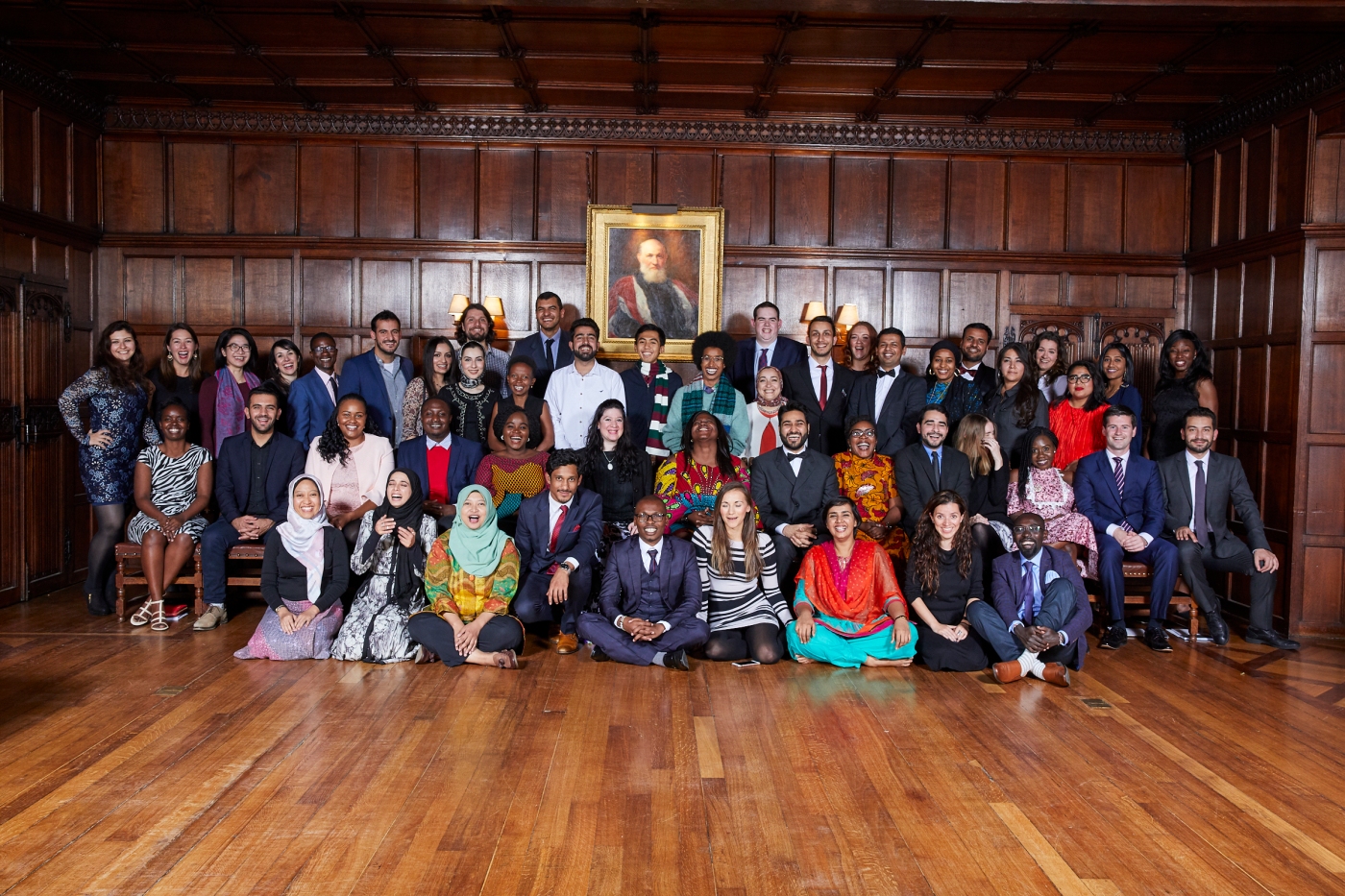
Last week, I began a series of posts about the British Council’s Future Leaders Connect Programme, you can find the first here – where I discussed the purpose of the programme and the application/selection process.
The programme was divided into two phases – we spent the first 5 nights at the University of Cambridge and the remaining 4 nights in London. Cambridge was amazing! Not only was the ambience amazing/serene, the entire time spend there provided me with a good opportunity for self reflection, introspection and deep thoughts. Honestly I do not know where to begin because it was an absolutely fabulous experience but I shall do my best to cover both the work and fun parts.
- Moller Centre
At Cambridge, we lived and had our daily sessions at the Moller Centre, Churchill College. The Moller Centre is a world-class dedicated residential leadership development and conference centre. Honestly, I found the architecture, ambience, spaces and colours purposely designed for thinking, reflection and relaxation.
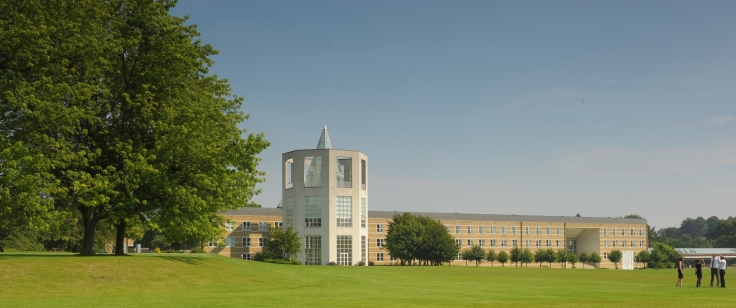
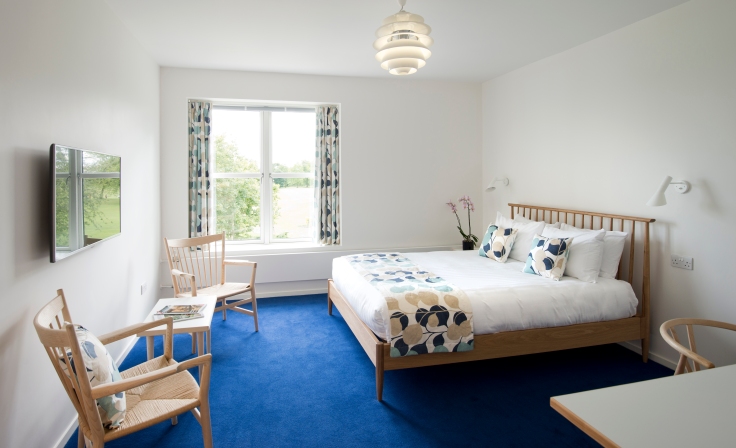
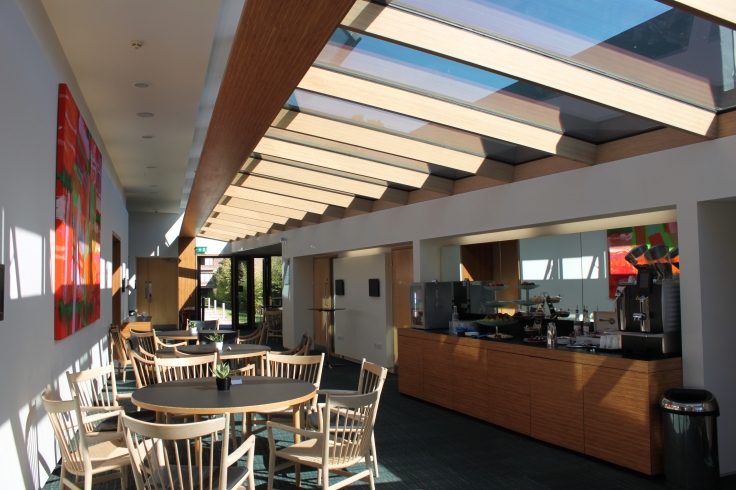
2. The sessions
I cannot possibly write about all the sessions we had but I shall highlight some of my favourite.
Leadership sessions with Moller Centre Staff
Everyday we had sessions with staff of the Moller Centre: Richard Hill – Associate, Moller Centre Executive Education; Cathy Butler, Moller Centre Executive Education – Director of Programmes and Gillian Secrett – the CEO. Their sessions were focused on leadership and they consistently forced us to think deeply and evaluate our perceptions and styles of leadership; define the values we think we should have as Leaders evaluate our leadership skills.
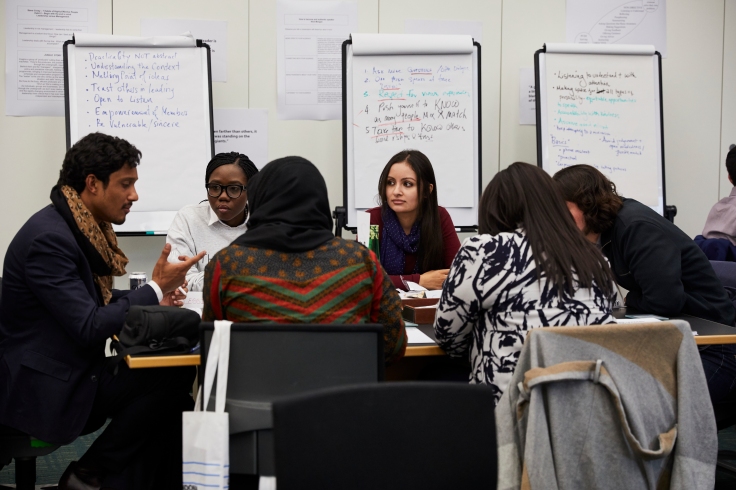
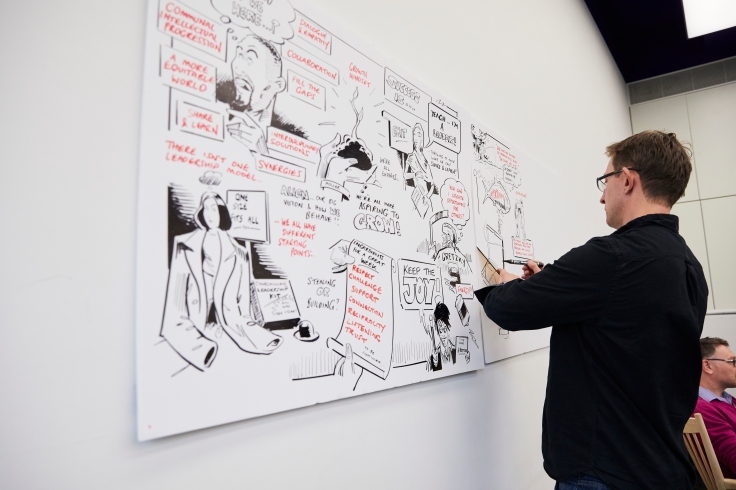
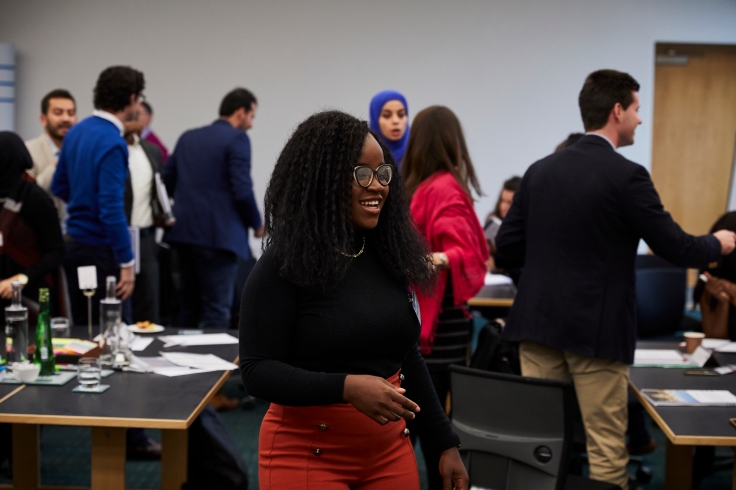
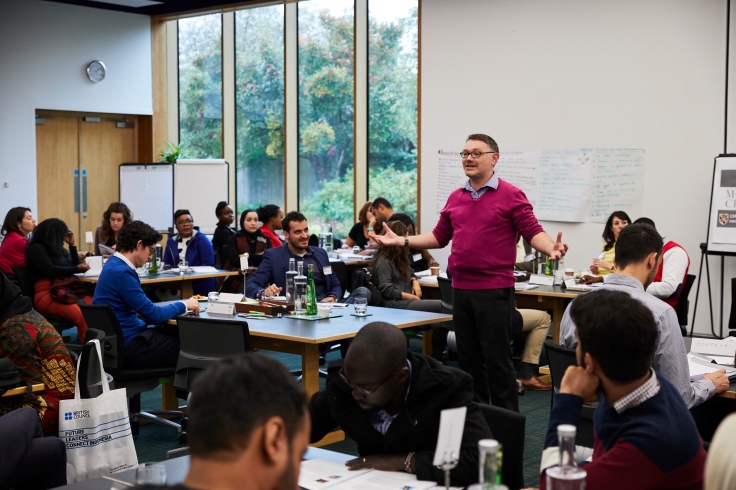
Often times we had to work in groups to accomplish tasks and discuss our policy visions; in retrospect, I found this sessions very important as consistently talking about my vision caused me to rethink, reflect and reevaluate my plans. One thing I liked was the thought that was put into the sessions, the table designs, writing materials and other props were often rearranged to suit the nature of each session.
Policy and Leadership in practice
One of my best panel discussions was ‘Policy and Leadership in practice’, the Speakers included Lord Richard Wilson- Former Cabinet Secretary from 1988 – 2002; Abhik Sen- Head of Policy and Research, Commonwealth Secretariat and Kajal Odedra – UK Director, Change.org. I was really intrigued by Lord Richard wilson’s presentations as he elaborated on the practicalities of policy making especially the role of power in politics. I found it very insightful because he was very candid about the struggles policymakers face when trying to strike the balance between politics and policy. I have always found it a bit naive when people feel it is possible to be a ‘technocrat’ or ‘policymaker’ and not care about politics. This is because to the extent that policy making involves the allocation of resources, it will definitely have political implications.
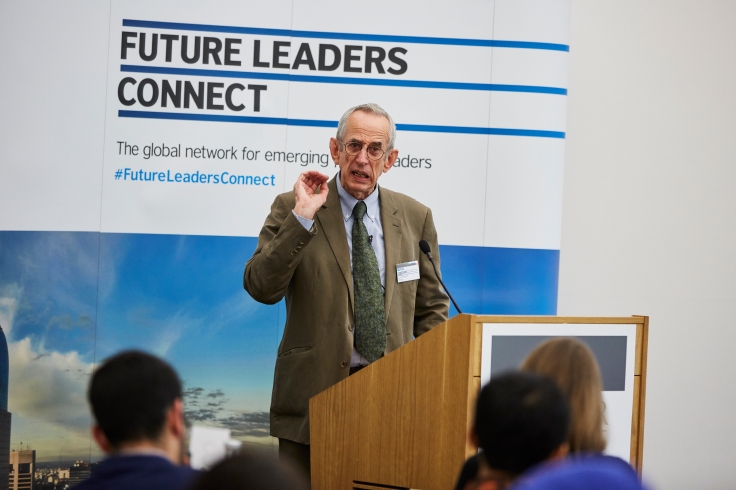
Here are some gems from Lord Richard Wilson’s remarks.
- Policy is all about power, you have to understand power to make things work.
- People tend to underestimate their own power, if you work together as a group, you will be much more powerful.
- Power is a skill that can be learned. Power is fluid, it moves.
- Power attracts more power, so powerful people delegate power.
Country Presentations
One of my favourite sessions was the country presentations, #teamNigeria totally rocked and I could not be prouder of our delegation! So prior to the programme, each country group was asked to bring:
- One item should represent what good leadership looks like
- One item should represent what leadership is needed in the future
- One item should represent a key characteristic leaders will need
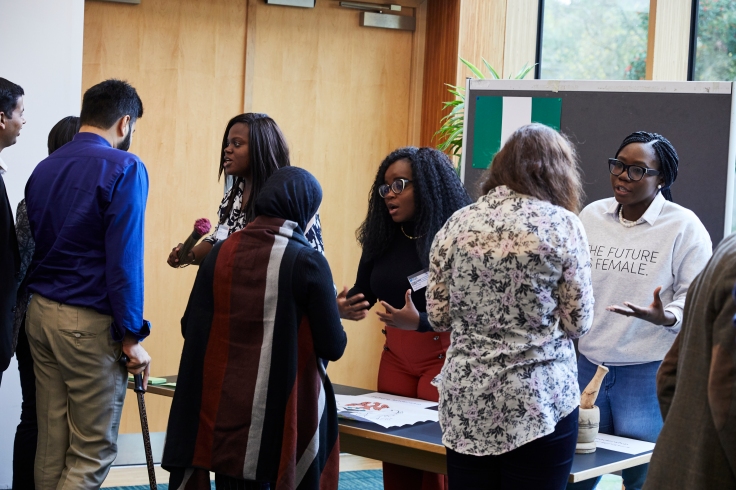
We brought a broom in response to question 1, we chose it given its ubiquitousness in all Nigerian homes. We think that good leadership in Nigeria should be pervasive across all classes, religion and ethnicities. Also we think that good leadership should be unifying, an individual broom stick is useless, only a collection of broom sticks can be used to sweep; thus Nigeria is stronger together than apart.
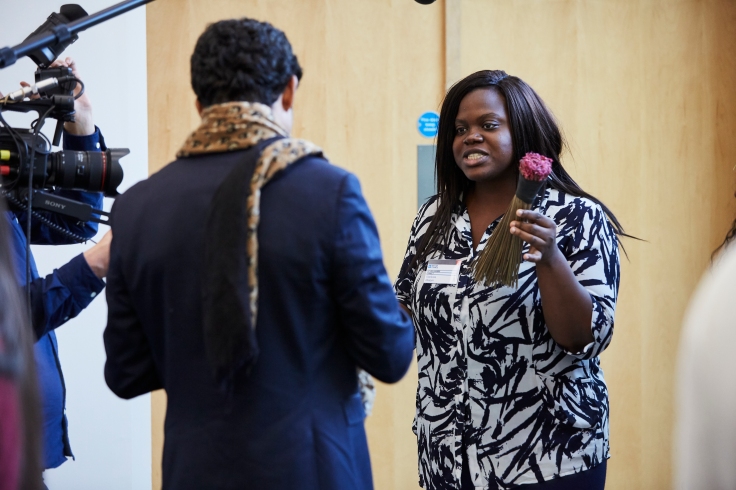
We choose the Nigerian coat of arms to represent the leadership needed in the future; visionary like the eagle and courageous like the horses. We think the ‘Y’ sign which symbolises the confluence of river Niger and Benue illustrate how we can leverage our diversity for greater good. Finally the grass which represents fertility can also be used to represent fertility of ideas, innovation, creativity etc.
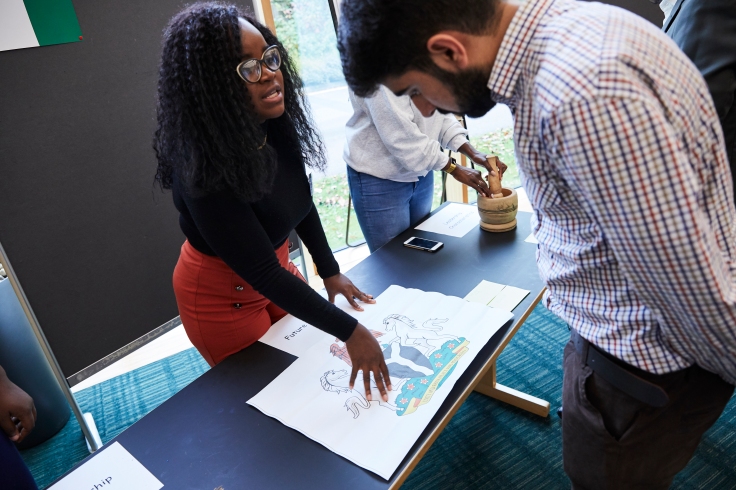
Finally, we took the Mortar and Pestle to represent a key characteristic leaders will need – this item is found in almost all Nigerian homes and is used to combine spices or food items into very beautiful outcomes. We think that leaders should be strong, resilient, adaptable and willing to go through difficult conditions knowing that the end process will be desirable and worth the stress.
3. Other sessions
We had a session with Dr Steven Wooding of Cambridge University who took us through the use and misuse of data in policy making. I found it very useful as it reiterated the need to be careful when analysing policy proposals or arguments supposedly backed up with data as it is very malleable. I also found the design thinking class very helpful especially for brainstorming and thinking through ideas, I never realised how supposedly simple questions like ‘why’ and ‘how might we’ could ease our thought process.
Fun times
It was not all intellectual and deep stuff, despite how intense and demanding the programme was, we made out some time to have fun in Cambridge.
- Tour of Cambridge
Upon arrival, we were taken on a tour round Cambridge. I felt like I was being taken back in time as every single thing – buildings, rivers, trees etc. appeared to be steeped in such deep history.
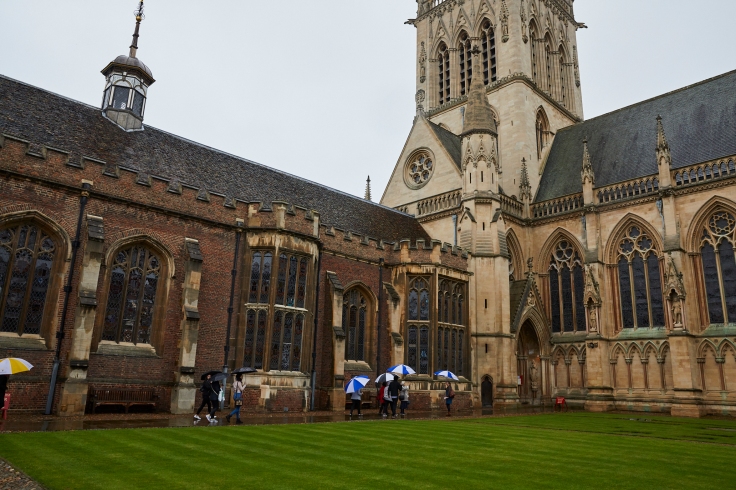
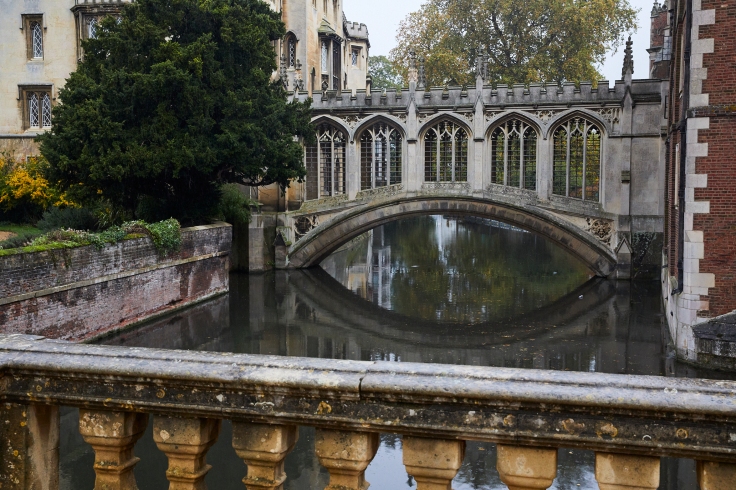
2. Dinner at Peterhouse College
We were hosted to a formal dinner at Peterhouse College. Honestly, it felt like we were in a Harry Potter Movie, lol! One of my best memories from the evening were the commendations the Nigerian ladies received as we were beautifully clad in ‘Ankara’ – our traditional outfit; safe to say we ‘killed’ it – lol!
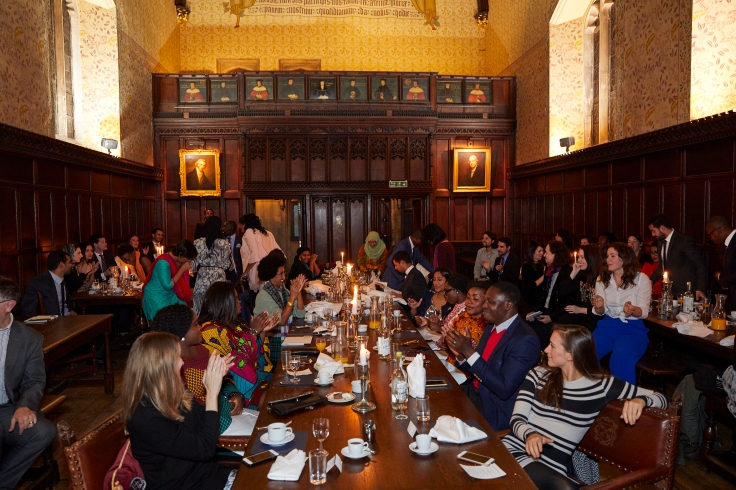
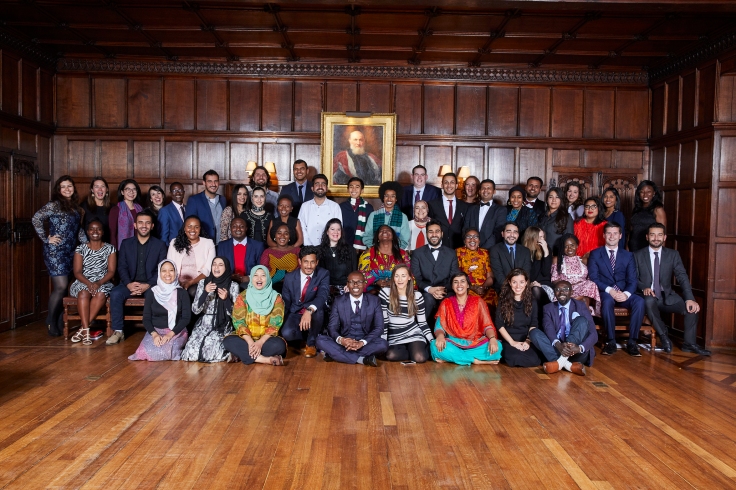
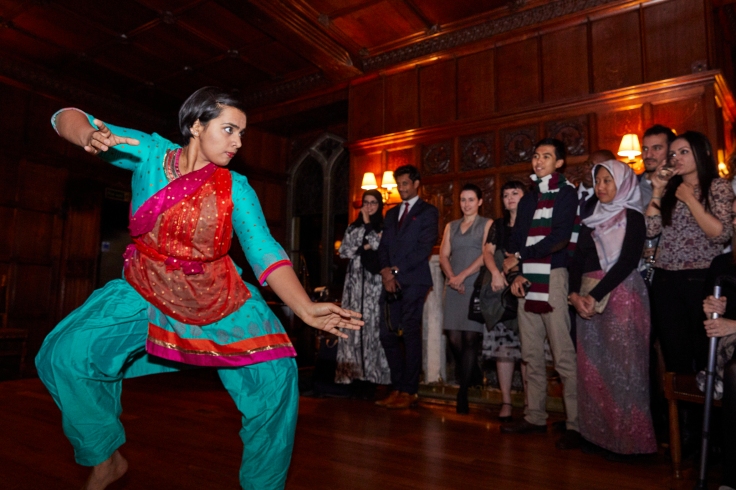
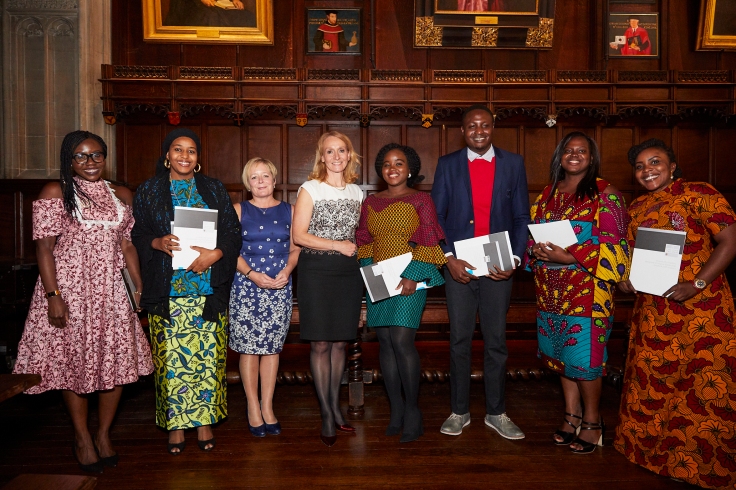
3. Punting
Finally, we engaged in a traditional Cambridge activity ‘punting’, it was so much fun exploring the sounds and sights of beautiful Cambridge along the river Cam.
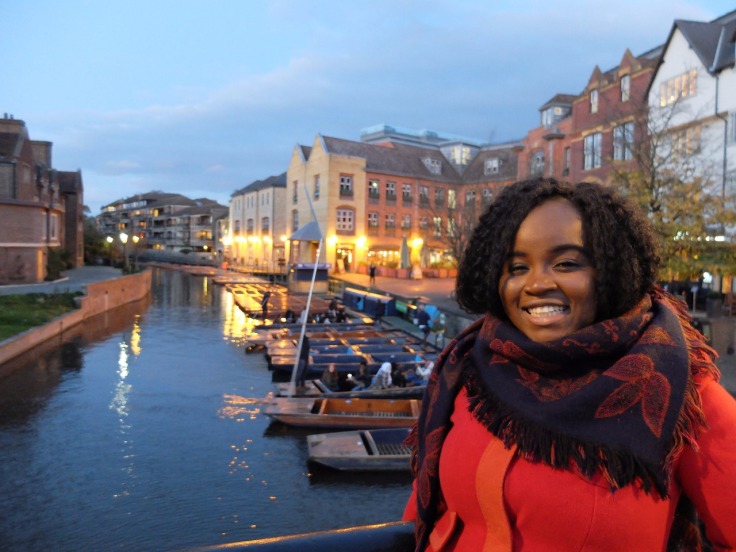
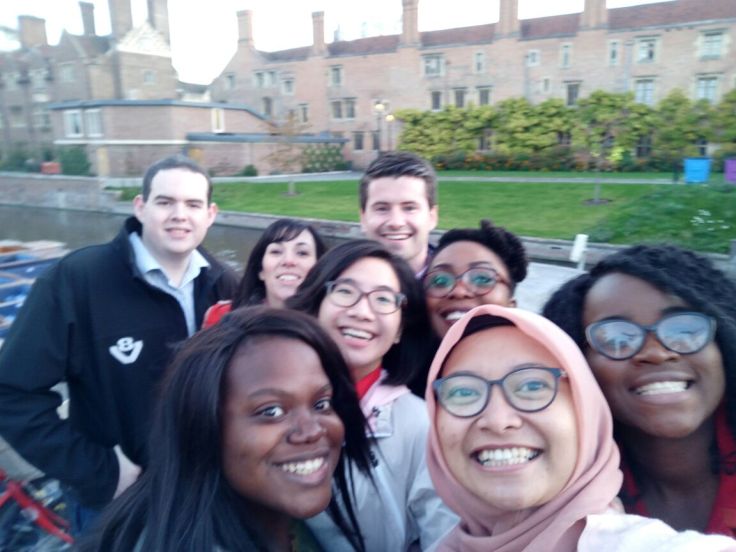
Honestly, this post does not fully capture the wonderful experiences and beautiful memories that were created at Cambridge! I am thankful to the British Council for this once in a lifetime opportunity.
Make sure you follow the blog and watch out for part 3 where I share my rockstar experiences in London – Walking with Kofi Annan, Ban ki Moon, Graca Machel and Richard Branson; visits to the UK Houses of Parliament, BBC and no 10. Downing street. You cannot miss this.
Amaka.
Photo credits : Future Leaders Connect, Moller Center and off course me 
Tuesday, 21 November 2017
On replay...
I so love this new song by John Fleming, not necessarily because I was in the studio a day before its release but it actually speaks to the foundation of my faith in Jesus. Its been 'On replay' for a long time. Hope it blesses someone out there!
Saturday, 11 November 2017
On replay...
The past week has been the most difficult for me this year. From 1st of November, it was like.....God we need your grace & help. But I am thankful for His name, His deliverance & His peace...It is indeed well!
Wednesday, 8 November 2017
Entrepreneur Minds- Integrity In Business
Ibukun Awosika is one of the women I really admire. When you have held your head over the parapet, done things the right way even though it seemed unpopular at the time and are goal driven, such people earn my respect and admiration and this woman is one of the few people I really admire.
Listen to her and find out reasons why in this short video
Friday, 3 November 2017
Today's reminder...
In my teens, I considered poetry really boring. I love to read fiction, I think I have read every book of Danielle Steel, John Grisham, Jeffrey Archer and quite a lot of others that I can't even remember. Wow, how can I forget the 'mills & boon' days 😀. Poetry however was never my thing. But now, I can actually read and enjoy reading poetry and I actually follow a poet on instagram Pierre Jeanty. And this is a piece of what he wrote....
Nice right? 😀
Nice right? 😀
Keep your spiritual glasses clean
‘Be
clean, you who bear the vessels of the LORD.’
Isaiah
52:11
One day a man was getting his windscreen washed at a
petrol station. When the attendant finished, the man said, ‘That’s a terrible
job. Re-do my windscreen - it’s as dirty as when you started.’ So, the
attendant wiped it again. The man looked it over and in frustration said, ‘That
window hasn’t changed a bit.’ The man’s wife was sitting next to him in the car
fuming. She reached over, pulled off his glasses, wiped them, and gave them
back to him. The attendant had been doing his job correctly. The man himself
was the problem all along. Spiritually speaking, the glasses you’re looking
through determine what you see, and how you see it.
| Redbubble.com |
When you look through the
lens of jealousy and envy, you become resentful of the blessings of others.
When you look through the lens of judgementalism, you speak and act without
mercy and grace. When you look through the lens of fear and unbelief, you limit
God and forfeit what He can do for you. When you look through the lens of
selfishness, you put yourself first and your loved ones suffer. When you look
through the lens of negativity and cynicism, people begin to avoid you because
you’re not enjoyable to be around. ‘Be clean, you who bear the vessels of the
LORD.’ Just as your glasses need to be wiped clean from the contamination
around you, so do your heart and mind. How does this happen? Jesus said, ‘Now
ye are clean through the word which I have spoken unto you’ (John 15:3 KJV).
Through prayer and daily Bible reading, your perspective on life is kept right.
http://www.ucb.co.uk/word-for-today-52355.html
Saturday, 28 October 2017
Elly's Thoughts
A lot of people are making a mess of their message. Please stick with your role and if at any point in time you are switching roles which is quite acceptable, please be very SPECIFIC what role you are assuming. Some issues leave a really sour taste!
Friday, 27 October 2017
Volunteering at TBN
I have been watching TBN (Trinity Broadcasting Network) for the past 17 years and its one channel I practically cannot do without. In the UK, its on free view which means millions of people have access to it without having to pay any form of subscription fee. They are reliant on goodwill donations from the public which is one of my reasons for making financial donations to them.
I also met lovely individuals who were either volunteers, guests or full time staff. The atmosphere was quite nice and welcoming.
Yesterday, I was at a Praise Special live audience recording as a volunteer. Prior to this few weeks ago, I made a donation to TBN and as I read a letter of appreciation that was sent to me by post, something in me said "Elly take it a step further and volunteer to help with your skills also". Deep down I felt, not just yet! my schedule is quite tight as I have got a lot of deadlines.
I however obeyed and sent them an email indicating my availability to volunteer if volunteers were needed. And this is how I ended up at TBN studios in London yesterday. It was such a wonderful experience and I was so blessed listening to the various individuals who came up to give their testimonies and highlight all they are doing for the Kingdom.
There was also beautiful worship led by John Fleming from his new album which actually gets launched today. So we got to have a first taste of it. 😊
The aesthetics of the whole building is, contemporary and quite calming. Such a lovely and massive building. I enjoyed a tour around some floors. Even the bathrooms are really lovely too lol!
There has been so much going on with Christianity and a strong divide between what should be acceptable standard with people making up their own doctrine to suit them as they go along. One thing remains constant however... Jesus Christ is the same yesterday, today & forever (Heb 13: 8). And they that know their God, will be STRONG & do exploits (Dan 11:32). If there is anytime that strength is needed in this day and age, it's now. Not necessarily physical strength, but emotional, spiritual & psychological strength. God help us all.
Subscribe to:
Comments (Atom)
Featured post
People Collector!
If I have not learnt a lot in life, I have learnt that every single thing as well as every single person in our lives, happens for a reason....

-
Yes a forth night ago, I brought to you a post by Amy Chan on the 11 differences between dating a girl and woman, if you missed it go HERE ...
-
About 4 weeks ago, I brought you a few pictures of the Just Giving phase 1 project between Sparkles "Just Giving" and Ellyeleanor ...

















